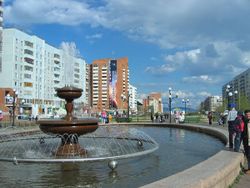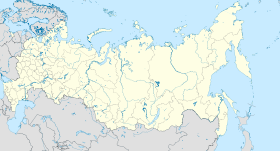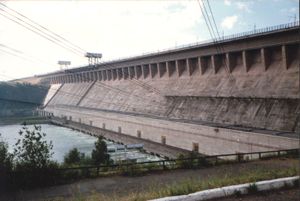Bratsk
| Bratsk (English) | |
|---|---|
| — Inhabited locality — | |
 Fountain on Sovetskaya Ulitsa, Bratsk |
|
 Location of Bratsk in Russia
|
|
| Coordinates: | |
| Administrative status | |
| Country | Russia |
| Federal subject | Mandatory parameter. Please, specify |
| Statistics | |
Bratsk (Russian: Братск) is a city in Irkutsk Oblast, Russia, located on the Angara River near the vast Bratsk Reservoir. Population: 259,335 (2002 Census). Although the name sounds like the Russian word for 'brother' ('brat'), it actually comes from 'bratskiye lyudi', an old name for the Buryats.[1]
Contents |
History
The first Europeans in the area arrived in 1623, intending to collect taxes from the local Buryat population. Permanent settlement began with the construction of an ostrog (fortress) in 1636 at the junction of the Oka and Angara rivers.[2] Several wooden towers from the 17th-century fort are now exhibited in Kolomenskoye Estate of Moscow.
During the Second World War there was an increase in industrial activity in Siberia, as Soviet industry was moved to the lands east of the Urals. After the war's end, development slowed as resources were required in the rebuilding of European Russia.
In 1947, the Gulag Angara prison labour camp was constructed near Bratsk, with capacity for up to 44,000 prisoners for projects such as the construction of the railway from Tayshet to Ust-Kut via Bratsk (now the western section of the Baikal Amur Mainline).[3]
The city's rapid development commenced with the announcement in 1952 that a dam and hydroelectric plant would be built at Bratsk on the Angara River. The 4,500-megawatt Bratsk hydroelectric plant was built between 1954 and 1966, bringing numerous workers to the town.
Other industries in the city include an aluminium smelter and pulp mill.
Economy and Infrastructure
Bratsk is served by the Baikal Amur Mainline railway and Bratsk Airport. There is a hydrofoil up the Angara to Irkutsk.
The city's economy is largely reliant on heavy industry, including one of Russia's largest aluminium plants, lumber mills, chemical works and a coal-fired power station.
Higher educational facilities include the Bratsk State Technical University and a branch of the Irkutsk State University.
Administrative districts
Bratsk is spread around the head of the Bratsk Reservoir. The city is divided into three administrative okrugs (populations are as of the 2002 Census):
- Padunsky (Падунский), 60,142 inhabitants;
- Pravoberezhny (Правобережный), 39,524 inhabitants;
- Tsentralny (Центральный), 159,669 inhabitants.
Residential districts of the city, some of which are separated by open country, include: Bikey, Chekanovsky, Energetik, Gidrostroitel, Osinovka, Padun, Porozhsky, Sosnovy, Stenikha, Sukhoy, Tsentralny, and Yuzhny Padun.[4]
Pollution
Bratsk was among the Blacksmith Institute's "Dirty Thirty", the thirty most polluted places in the world.[5]

Until recently, the Bratsk Reservoir - one of the world's largest - was a source of drinking water for many nearby cities. In 1998, after tons of mercury were found at the bottom of the reservoir, warnings were posted urging local citizens to avoid the reservoir at all costs. However, owing to Russia's economic troubles, the reservoir still remains a source of fish and other food products for many hard-pressed local residents. According to Yuri Udodov, head of the Federal Committee on Ecology (FCE) in the state of Irkutsk, this region has "the highest rate of discharge of metallic mercury into the environment [in] all of Siberia."[6] The extent of mercury pollution in the ground around the nearby Usolye chemical plant is equal to half the total global production of mercury in 1992.[6]
Bratsk has been declared an ecological disaster zone. The Bratsk Aluminium Plant has been polluting its surroundings to such great degree that the town of Chikanovskiy was evacuated in 2001 due to repeated health emergencies.[5]
Nature
Contrary to high level of pollution in the city, the Bratsk region remains very pure place. Water in the rivers drinkable without additional processing, the cleanest air of the woods forests, impressing landscapes of a taiga, huge territory without people. It involves all in area of tourists from all globe: on popularity in the world among places of ecology tourism the region competes with lake Baikal.
International relations
Twin towns — Sister cities
Bratsk is twinned with:
See also
- Bratsk hydroelectric plant
References
- ↑ Athol Yates and Nicholas Zvegentzov, 'Siberian BAM Guide', 2001
- ↑ The city of Bratsk
- ↑ Gulags in the Baikal region on the website of Memorial (German)
- ↑ Братская городская Дума. №187/г-Д 31 июля 1998 г. «Устав муниципального образования города Братска», в ред. Решения №260/г-Д от 18 февраля 2004 г. (Bratsk City Duma. #187/g-D July 31, 1998 Charter of the Municipal Formation of the City of Bratsk, as amended by the Resolution #260/g-D of February 18, 2004. ).
- ↑ 5.0 5.1 The Blacksmith Institute
- ↑ 6.0 6.1 Earth Island Institute: Earth Island Journal - World News (Winter/Spring 1998-1999)
External links
|
||||||||||||||